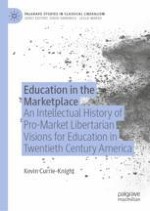This book offers an intellectual history of the libertarian case for markets in education. Currie-Knight tracks the diverse and evolving arguments libertarians have made, with each chapter devoted to a different libertarian thinker, their reasoning and their impact.
What are the issues libertarians have had with state-controlled public schooling? What have been the libertarian voices on the benefits of markets in education? How have these thinkers interacted with law and policy? All of these questions are considered in this important text for those interested in debates over market mechanisms in education and those who are keen to understand how those arguments have changed over time.
